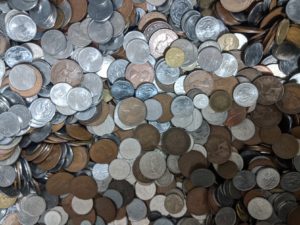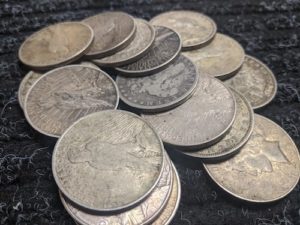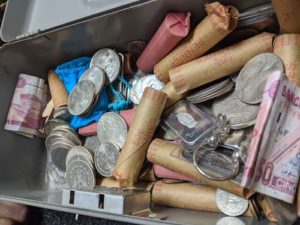Oakton Coins & Collectibles buys inherited coin collections.
As a coin shop that buys and sells, we come in contact with a lot of people who have inherited coin collections. This is a guide to help you figure out what to do with it, depending on the size and worth of the collection.
No matter the size, you can bring it in for a free verbal appraisal. Often people sell the whole collection. Sometimes, they sell the valuable parts and split up the rest between siblings. Maybe it’s a small collection without a lot of monetary value and you have someone young in your family that would appreciate it.
The coin collection you inherited was probably put together by someone with the collector mentality. If you have the same concept of collecting, you already understand. If you don’t have the collector mentality, this is a guide to understanding it.
For people who collect, the value of their collections is not monetary, it’s emotional. The collections allows some people to relive their childhood or connect to a period or time they feel strongly about.
Some people collect for the thrill of the hunt. For these collectors, collecting is a quest and a lifelong pursuit which can never be completed.
Collecting may provide psychological security for some people by filling a part of the self they feel is missing or is void of meaning. When one collects, one experiments with arranging, organizing, and presenting a part of the world which may serve to provide a safety zone or a place of refuge that calms fears and manages insecurity.
Motives are not mutually exclusive; rather, different motives combine for each collector for a multitude of reasons. Every coin collection is unique; some you can retire on, but many are only worth spending as pocket change. Either way, collecting coins is usually more valuable than, say, collecting sea glass.
Coin collecting can be a difficult hobby to figure out for inexperienced collectors. The internet is not always that helpful. When you’re searching for coin prices online, you will have to learn to differentiate between real world pricing, wishful thinking pricing, and clickbait pricing. It can be very difficult for coin sellers to find coin prices on the internet, as it’s full of wishful-thinking pricing and clickbait pricing.
Something to consider: Did the collector spend substantial sums on the collection?
Interesting coins are available to buy for every budget, so ask yourself the following questions to help determine the value of the collection you want to sell:
Can you determine how much money the collector spent or how regularly the owner bought? Can you find any bills of sale, invoices, or canceled checks from dealers or auction firms? Do you have an insurance policy or a will with instructions?
This information may be helpful, but you can’t completely depend on any of it. The value of coins (and collectible paper money), like the value of anything else, is what a willing buyer will pay a willing seller. This is never a fixed figure. The market fluctuates in varying degrees and at unpredictable rates.
Frequently Asked Questions for inherited a coin collections.
Should I remove coins from an album that was assembled by a collector?
Coins that a collector selected and placed in an album have a greater chance of being worth more than their metal value. It is much easier for us to search for key or rare dates in an album than in a heap of coins. If your coins are already in a book, it is best to keep them intact until we can review them.
Should I clean my dirty coins before selling them?
No, never try to clean a coin, no matter how dirty or ugly it looks. Cleaning damages the coin.
Are old coins worth a lot of money?
Age alone does NOT make something rare or valuable! Age has almost nothing to do with the value of a coin. Ancient Roman coins can be purchased for $5-$10, whereas a gem 1956 Franklin half dollar recently sold at auction for over $100,000. Rarity and condition are what makes a coin valuable. The combination of both is when the big bucks come into play. Popularity is also a factor, but 99% of all coins in existence are only worth the metal of which they are made (or less).
Do you report customers selling to the IRS?
No, what you sell is for you to report.
Should I sort my coins by date before bringing them in?
Often, people bring us their coins carefully arranged by date and decade, usually placed in separate Ziploc bags or paper envelopes/coin tubes. You might be tempted to do this, but it’s not worth the effort.
When we appraise a collection, the first thing we do is separate coins by their composition (e.g. copper, nickel, silver, or gold). If you must organize your collection, put it into these groups:
- Gold coins
- 9o% silver dollars (1878 through 1935)
- 9o% silver dimes, quarters, and half dollars (1892 through 1964)
- 40% silver JFK half dollars (1965 through 1970)
- Lincoln Wheat Cents (1909 through 1958)
- Buffalo Nickels (1913 through 1938)
- Jefferson Nickels (1938 and later)
- All other obsolete U.S. type coins
- U.S. Mint proof and uncirculated sets
- U.S. Mint commemorative sets
- Currency and paper money
- Foreign coins/tokens



